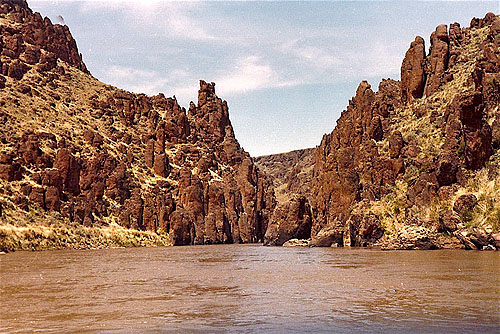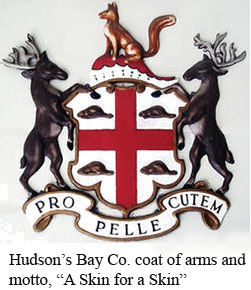Hudson's Bay Company
by Roger Kaza
Today, fur traders and far-off borders. The University of Houston's Music School presents this program about the machines that make our civilization run, and the people whose ingenuity created them.
Hudson's Bay Company is the oldest corporation in North America. But this fur empire didn't get that way by being warm and fuzzy with the employees or their four-legged quarry. In 1819 the company was exploring the vast volcanic tablelands of what is now SW Idaho. They sent three of their trappers into the headwaters of a large river. The three were Sandwich Islanders—native Hawaiians. They vanished and were never seen again. The Bay later named the river "Owyhee" in their memory. By the way, that's with an "O", not "H."
But was it only beaver pelts and balance sheets that drove this Crown-chartered British company across the trackless wilderness? The Snake river country, into which the Owyhee flows, was hardly suited to the Bay's traditional mode of transport, birchbark canoes. The region is all deserts, rocky chasms, and muddy streams filled with falls and rapids. The company's main competition in the fur business came from freelance mountain men — misfits and loners. It was like Wal-Mart vs. the corner grocery. But the corner grocer had one advantage. Most likely, he came from America.

Owyhee River Canyon
It's hard to imagine our country today without Oregon, Washington, Idaho, and parts of three or four other western states. But in the 1820s, the colonizing powers considered the whole region up for grabs. America and Britain kept renewing "joint-occupation" treaties. The underlying rule of this game: whoever occupies most, wins. Possession really was nine tenths of the law.
So the Hudson's Bay Company was doing their bit for royal occupation when those unlucky trappers met their demise in the Owyhee canyon. But the Americans kept coming. And only a few years later, in 1825, Bay policy took a new and darkly cynical turn. The Bay trappers were ordered to scour the land bare, to kill and skin every single beaver they could find. The rationale: if there are no beaver, there will be no reason for the Yanks to come. Or, if the US finally ended up winning the Oregon territory, at least Hudson's Bay would have the last of the prized furs. It was scorched-earth commerce, with the poor beaver caught in the crossfire. Peter Skene Ogden, the captain of the Snake River brigade, carried out his grim orders, but not without misgivings. To him it went against the grain, for the 150 year-old company to be robbing its fur future.
 In the end, though, the Bay's strategy turned out to be ruthlessly pragmatic. The US did win the Oregon Territory, in 1848. The blazing of the Oregon Trail had caused a flood of immigrants that could not be stopped. Fur-felt hats finally went out of fashion, but they didn't do so in time to save the Rocky Mountain beaver population. The beavers never did fully recover.
In the end, though, the Bay's strategy turned out to be ruthlessly pragmatic. The US did win the Oregon Territory, in 1848. The blazing of the Oregon Trail had caused a flood of immigrants that could not be stopped. Fur-felt hats finally went out of fashion, but they didn't do so in time to save the Rocky Mountain beaver population. The beavers never did fully recover.
But Hudson's Bay did. Today the Company is only a decade or so away from celebrating its 350th birthday. They now run department stores, insurance and mortgage companies. It's one of Canada's most distinguished brands—you saw their clothing on the Canadian Olympic teams. From beaver pelts to Spandex—talk about corporate reinvention.
I'm Roger Kaza, at the University of Houston, where we're interested in the way inventive minds work.
There are many histories of the Hudson's Bay Company. One of the most comprehensive and entertaining is Peter C. Newman's three volume The Story of the Hudson's Bay Company (Viking, 1987). Much of the material above comes from the second volume, Caesars of the Wilderness, pages 276-283.
Owyhee Trails: The West's Forgotten Corner. Mike Hanley and Ellis Lucia. Caxton Press, 1973. The three trappers were likely killed by Bannock Indians. In addition to being a wild river with over 250 miles of navigable waters in Oregon, Idaho and Nevada, Owyhee is a county in the SW corner of Idaho. The Idaho Candy Company manufactures Owyhee-branded candies, including the legendary Idaho Spud.
A New York Times article on the Owyhee.
The origin of the "Hudson's Bay's enigmatic motto, Pro Pelle Cutem, has never been fully explained. Literally meaning, "a skin for a skin," some feel it is an ironic play on a passage in the Book of Job, Chapter 2, verse 4, acknowledging the ever present dangers of a fur trapper's life: "And Satan answered the Lord and said: Skin for skin; yea all that a man hath, will he give for his life." Others, myself included, feel it may be simply functional, describing the (now controversial) wearing of fur: an animal's skin, to use as your second skin.